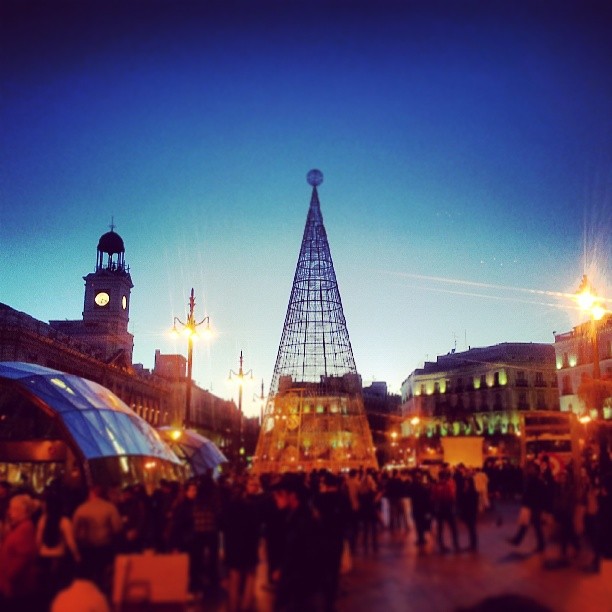10 must-know tips before moving to Madrid
The allure of travel lies in the adventure. Scott didn’t venture to the South Pole for the climate; it was to discover and learn about new lands. He didn’t know what was out there, so off he went. In that sense, it is impossible for me to tell you everything you will discover when you get to Spain, and to be quite truthful, I wouldn’t want to spoil the surprise.
That being said, Scott didn’t set off without the necessary tools either, and it would be ill-mannered of me to allow you to. So think of me as your concerned parent, fretting over whether you are bringing enough socks, while I turn a blind eye to the other things you may have happened to pack from your sock drawer.
-
Getting a Sim-Card

When thinking about a sim-card you need to consider three things: minutes, texts, and data. Wrong. You’re in Spain, where the love between the Spaniards and WhatsApp is so strong it has given birth to a lovable little verb called “Whatsappear”. Swiping through my phone, the latest text I received dates back to 3 months ago. And it was from the UK. Don’t waste your money – think calls and internet.
-
Getting Your NIE
The NIE is your tax number. If you’re still with me after that exhilarating first sentence, my advice to you is to resist the temptation of the Spanish nightlife for a few days and get this one done and dusted. Or be like yours truly and wake up one day with a vague recollection of the last six months and wonder what all this talk of a ‘knee-eh’ is about. All in all, it is your ticket to a bank account, employment, and all the other things we weren’t taught about in school.
-
Getting an Abono
This one depends on how close your work is to your home, which you probably don’t know yet because you haven’t read Number 4. If you have to take the metro on a daily basis then getting an abono will save you a lot of money on what is already a cheap and excellent transport system. If possible, make an appointment on the Madrid Transport website as soon as possible, as it may come in handy when flat-hunting too.
-
Finding a Flat
Finding a flat can often make you feel more frustrated than a Spaniard trying to understand your woeful Spanish. You will start to convince yourself you can live in the hostel forever until the start-date of your job looms ever closer, when you realise that the happy-go- lucky guy you’re sharing a room with is not in fact the first thing you want to see or smell before you start your day. You will see a lot of flats, and get rejected a lot too, but remember you are not alone. Idealista.es and easypiso.com are there to hold your hand, as well as some spot-on advice from your very own Just Landed.
-
Landlords
When you find a flat you won’t necessarily get a chance to get to know your landlord or even meet them. This can be troublesome in Madrid, as from personal experience and tales from friends I have learned the majority of landlords here are not fantastic. My first landlady invited herself into our flat whenever she pleased, whether or not any of us were currently in the flat. She would also try to charge us a “popularity tax” if we had a friend stay for a night or weekend.
My current landlord, much less than coming over uninvited, seems to be the timid type and will not accept our invitations to the flat, particularly when something needs fixed.
-
Banking
Assuming you are hoping of having an income while in Spain, you are also going to need a bank account. With many to choose from, it can take quite a while to investigate which is best for you. From my experience, as a foreigner it is a little tricky. Most banks will require a NIE to open an account, without which they will force you into add-ons that you don’t necessarily want, such as monthly health insurance (BBVA). I did manage to find Banco Sabadell however, who let me join with just my passport, although I was later charged for not presenting a valid NIE within three months or so. I have heard from others that this fine seems to be gone now, and looking on their website it also appears to be the case.
-
“Ocho meses de invierno, cuatro meses de infierno”
Or, in English, “eight months of winter, four months of hell”. Like many Brits I had assumed that Spain was a beautifully warm and sunny land all year round, with oranges waiting patiently to be plucked from the branches of shady trees. Fortunately, C.J. Sansom warned me in no uncertain terms what ‘Winter in Madrid’ was really like, and I arrived braced for a cold which I had left Scotland to escape.
Onwards and upwards though, just like the summer temperatures. During July and August you will be looking back fondly on those days when you wrapped yourself in your duvet at night as you lie spread-eagled, finding rare solace in the fact that you’re single as the heat beats down on you with less mercy than the subjunctive on your Spanish.
-
Seeing the country
Spain is broken up into several distinct regions which vary by culture, food and even language. From bagpipes and pintxos in the north to flamenco and tapas in the south, there isn’t much reason to look any further than Spain when planning your weekends away. For this purpose, I recommend ALSA, an extensive and cheap coach service. For a more modern option, BlaBlaCar provides a great way to travel, with the priceless option of being dropped off right at your door. And for those still deciding on where to live, Madrid, while being a bustling capital, is also the very heart of Spain, making travel to all corners of the country accessible.
-
Leaving the country
If you decide to ignore what I just said above, and don’t hold an EU passport, you need to know how to travel outside of Spain. Once you have your NIE or student visa you can travel across the border without any problems. But with Spanish bureaucracy being what it is, you may find yourself waiting to for this for some time, or it may have already expired.
If this is the case you must get a ‘regreso’, a document which allows you to re-enter Spain if you travel across the border. Despite border control generally being very relaxed within the EU, if you do happen to get caught without this paper you could find yourself stranded.
-
Finding Spanish Friends
The cool clique reading this are probably thinking they don’t need advice on how to make friends, but this really is important. Depending on your type of job, meeting Spanish people can prove tricky at first. You’re surrounded by English speakers and it is all too easy to fall into a ‘guiri’ trap. Don’t despair though, use English to your advantage and trade it for friendship! Intercambio nights are a great way to meet Spanish locals looking to learn English, and you can use this to subtly creep into their hearts, while also improving your Spanish. Or download Tinder; it’s a brave new world.
Here’s hoping that my top 10 tips help you navigate this fantastic city! If you are planning to move to Spain (and my tips have not convinced you to choose Madrid) take a look at our Spain guide for all the practical information.
[Image: Antonio García Rodríguez]





